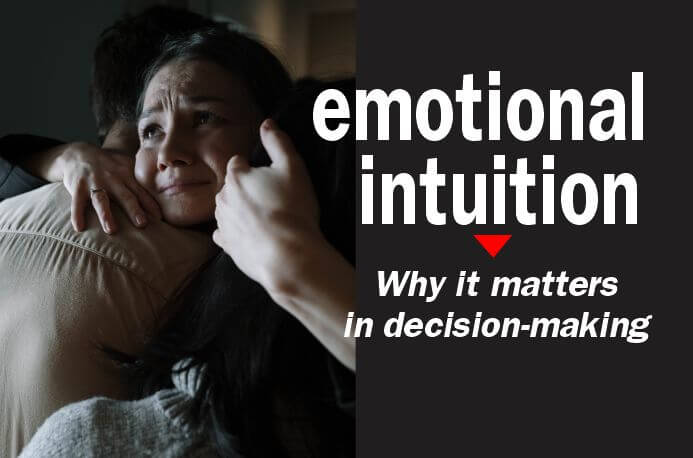Last updated on June 8th, 2025 at 12:30 pm
Explore the power of emotional intuition – understanding, empathizing, and connecting authentically with others through instinctive emotional insight.
Emotional intuition is the innate ability to understand and interpret emotions, both yours and those of others, without relying solely on conscious reasoning.
It involves tapping into your feelings and instincts to gain insight into situations, people, and decisions.
This intuitive sense can guide you in making choices, understanding complex social dynamics, and empathizing with others.
It is a powerful tool for navigating relationships, enhancing self-awareness, and making authentic, heartfelt connections with the world around you.
Table of Contents
- Understanding Emotional or Affective Intuition
- My Emotional Intuition Personal Experience
- Benefits of Emotional Intuition
- How Emotional Intuition Works
- Example of Emotional Intuition
- The Science Behind Emotional Intuition
- How Emotional Intuition is Different from Other Types of Intuition
- Limitations of Emotional Intuition
- Developing Emotional Intuition
- Balancing Emotional Intuition with Other Forms of Decision-making
- Balancing Emotional Intuition with Logic and Evidence-based Decision-making
- Conclusion
- Frequently Asked Questions
Understanding Emotional or Affective Intuition
Also known as affective intuition, it involves using your emotional smartness to recognize the emotions of others.
This is possible through their verbal and non-verbal cues, such as body language, tone of voice, facial expressions, and other subtle signs.
As one of the types of intuition, it plays a key role in social interactions as it helps individuals establish healthy connections and boundaries.
This skill can be developed through practice and feedback and can be a valuable asset in both personal and professional environments.
It is also closely linked to empathy, which is the ability to understand and share the feelings of others.
By cultivating this type of intuition, you can become more empathetic, allowing you to connect more deeply with others and provide greater emotional support.
My Emotional Intuition Personal Experience
During a job interview, I sensed something amiss despite the interviewer’s friendly demeanor.
My emotional intuition picked up on subtle cues, hinting at a mismatch between the company’s culture and my values.
As the interview progressed, my instincts grew stronger. I asked probing questions, and sure enough, my concerns were validated.
Trusting my intuitive emotion, I politely declined the job offer.
It was a decision guided by my inner emotional compass, leading me toward a better fit elsewhere.
Related: A Guide To Unleashing Your Inner Knowing
Benefits of Emotional Intuition

Understanding and interpreting personal emotions and those of others is critical to having smooth relationships and making better decisions professionally or in your relationships.
Developing this skill can have a significant positive impact on our lives.
Here are some of the importance of emotional intuition:
1. Better Communication
It allows us to read nonverbal cues and understand the emotions behind them, which can help us communicate more effectively with others.
For example, if we can sense that someone is feeling upset or frustrated, we can adjust our approach and tone to make them feel more comfortable.
1. Improved Relationships
By understanding and empathizing with the emotions of others, we can build stronger and more meaningful relationships.
Having intuitive emotions helps you to be more attuned to the needs of others, which can help build trust and deepen connections.
2. Better Decision-making
Your emotions play a significant role in your decision-making processes. It can help you identify your own emotional biases and make more rational decisions.
It can also help you to understand the emotions of others involved in the decision-making process, which can lead to better outcomes.
3. Enhanced Self-awareness
It can help us become more aware of our own emotions and how they influence our thoughts and behaviors.
By understanding our emotions better, we can regulate them more effectively and make healthier choices.
4. Improved Mental Health
It can help us identify and manage our own emotions and those of others, which can lead to improved mental health.
It can also help us to recognize and respond to the emotions of others, which can reduce stress and improve our overall well-being.
Related: Characteristics and Benefits of Introverted Intuition
How Emotional Intuition Works
Emotional intuitiveness helps you read and interpret nonverbal cues such as facial expressions, tone of voice, and body language to understand the emotional state of others.
This ability to understand emotions is thought to be based on the activation of mirror neurons in the brain.
Mirror neurons are cells in the brain that are activated both when a person performs an action and when they watch another perform the same action.
They are believed to be involved in empathy and the ability to understand and share the feelings of others.
Additionally, effective intuition can be influenced by past experiences and learning. Individuals who have had previous experiences with similar emotions may be better able to recognize and interpret them in others.
For example, someone who has experienced grief may be better able to recognize the signs of grief in someone else.
Generally, emotional intuition is a complex process that involves both innate neurological processes and learned experiences.
Example of Emotional Intuition
1. Strong Feeling Someone you Care about is in Difficulty
An example of emotional intuition is when you have a strong feeling that someone you care about is going through a difficult time, even though they haven’t explicitly told you.
You may sense their emotions through their body language, tone of voice, or even just an unspoken connection you have with them.
This intuition may prompt you to reach out to them and offer support, even if they haven’t directly asked for it.
2, Meeting Someone New and Having the Feeling they are Trustworthy
Another example could be when you meet someone new and you have a strong feeling that they are trustworthy, even though you don’t have any concrete evidence to support this intuition.
This may be based on subtle cues like eye contact, body language, or even just the energy they give off.
Related: Signs You Are Ignoring Your Intuition
The Science Behind Emotional Intuition
At the core of being emotionally intuitive is the ability to recognize and respond to emotions, which is primarily governed by the limbic system in the brain.
This includes the amygdala, which is responsible for processing emotional stimuli and generating emotional responses, as well as the prefrontal cortex, which is involved in regulating and controlling those responses.
When you encounter emotional cues, the amygdala processes the information, generating an initial emotional response influenced by past experiences and cognitive processes.
The prefrontal cortex interprets and modulates this response based on context, social norms, and personal goals.
Affective intuition integrates emotional information with sensory input and cognitive processes, supported by empathy and the mirror neuron system.
Understanding these mechanisms can improve social interactions and relationships by informing our responses to the emotions of others.
Related: The Role of Cognitive Intuition in Creative Thinking
How Emotional Intuition is Different from Other Types of Intuition
Intuition is a general term that refers to the ability to understand or know something without explicit reasoning or conscious thought.
Emotional intuition is a specific type of intuition that focuses on our ability to recognize and interpret the emotions of others.
There are several key differences between emotional intuition and other types of intuition:
- Emotional intuition focuses on understanding and interpreting emotional information, while other forms of intuition may involve different types of information, such as sensory or cognitive data.
- Emotional intuition is closely tied to our social interactions, allowing us to understand and respond to the emotions of others. Other forms of intuition may not have as direct a connection to our social interactions.
- Emotional intuition is heavily influenced by our past experiences and social background, shaping our intuitive responses over time. In contrast, other forms of intuition may be more innate or genetically determined.
- Emotional intuition is closely linked to empathy and emotional intelligence, crucial for successful social interactions and relationships, unlike other forms of intuition.
Limitations of Emotional Intuition
While it can be a valuable tool for decision-making, it also has limitations.
Some of its limitations include:
- Bias: It can be influenced by personal biases, past experiences, and cultural or societal norms. These biases can lead to incorrect judgments or decisions.
- Inaccuracy: Also, it is not always accurate or reliable. It can be based on incomplete information or incorrect assumptions, leading to poor decisions.
- Lack of objectivity: It is subjective and can be influenced by emotions and personal preferences. It may not always align with objective reality.
- Overconfidence: It can sometimes lead to overconfidence in one’s abilities to make accurate decisions. This can result in ignoring critical information or data that contradicts one’s intuition.
- Inability to explain: It can be difficult to explain or articulate to others, making it challenging to convince others to follow a particular course of action.
It is essential to recognize the limitations of this type of intuition and use it in conjunction with other decision-making tools to make informed and effective decisions.
Developing Emotional Intuition

Developing the intuition of emotion takes time and practice. Be patient with yourself and keep working on improving your emotional intelligence.
Here are some tips:
1. Practice Mindfulness and Self-awareness Practices
Mindfulness is being in the present moment and paying attention to thoughts and feelings without bias or judgment.
Practicing mindfulness can help you become more aware of your emotions and improve your ability to recognize and understand them.
2. Pay Attention to Body Language
Nonverbal cues, such as body language, can be an important indicator of how someone is feeling.
Pay attention to facial expressions, gestures, and posture to help you understand the emotions of others.
3. Practice Empathy
Empathy is the ability to understand the feelings of others and share the same by acting accordingly.
Practice putting yourself in someone else’s shoes and imagining how they might feel in a particular situation.
This can help you develop a deeper understanding of others’ emotions.
4. Reflect on Your Own Emotions
Take some time to reflect on your own emotions and try to identify what triggers them.
This can help you better understand your emotional responses and improve your ability to regulate them.
5. Reflect on Past Experiences
Think about past situations where you may have misread someone’s emotions or failed to recognize your own emotions.
Reflect on these experiences and try to identify what you could have done differently.
This can help you develop a better understanding of emotions in the future.
6. Seek Feedback
Ask others for feedback on your emotional responses and how they perceive your emotional intuition.
This can help you identify areas where you can improve and develop further.
Balancing Emotional Intuition with Other Forms of Decision-making
Balancing emotional intuition with other forms of decision-making is about finding a middle ground between emotional and rational thinking.
By recognizing the value of emotional intuitiveness while also considering all available information, you can make more informed and balanced decisions.
Here are some ways to achieve this:
- Recognize the value: It can be a valuable tool in decision-making, particularly when it comes to understanding the emotional needs and perspectives of others. However, it’s important to also recognize its limitations as it can sometimes be influenced by biases or assumptions.
- Consider all available information: When making decisions, it’s important to consider all available information, including both emotional and rational data. This means taking into account facts, figures, and logical arguments, as well as emotional cues and personal experiences.
- Take time to reflect: Before making a decision, take time to reflect on the available information and consider how your emotions may be influencing your intuition.
- Seek feedback from others: It can be helpful to seek feedback from others when making decisions, particularly from those with different perspectives and experiences.
Balancing Emotional Intuition with Logic and Evidence-based Decision-making
Balancing emotional intuition with logic and evidence-based decision-making is crucial for considering both rational and emotional factors.
While affective intuition provides insights into emotional impacts, it can be biased and unreliable.
Logic and evidence-based reasoning offer objectivity but may overlook emotional factors.
Integrating both approaches is essential for making well-rounded, informed decisions.
This can involve:
- Acknowledging and exploring emotions: Recognize and explore the emotions that are present in the situation, and consider how they might be influencing your thinking.
- Gathering and evaluating evidence: Gather as much objective evidence as possible to inform your decision. This might include data, research studies, expert opinions, or other sources of information that can help you evaluate the pros and cons of different options.
- Weighing pros and cons: Use both the intuitiveness of emotions and logical reasoning to evaluate the potential benefits and risks of different options. Consider how each option might impact you, as well as others who might be affected by the decision.
- Making a decision: Based on the above steps, make a decision that takes into account both intuition and logic/evidence-based reasoning. It may be helpful to reflect on how you arrived at the decision, and consider whether any lingering emotional or rational concerns need to be addressed.
Conclusion
Emotional intuition is essential in communication for quality interaction in society.
The ability to understand the emotions of people by merely watching and taking in cues is a competence that everyone who wants to be an effective member of society must master.
Developing this ability is a gradual process and entails paying attention to body language, self-awareness, empathy, and reflecting on one’s own emotions.
However, one should not solely rely on the skill as it can be measured and so can fail without a signal.
It is in good taste to always back it up with critical thinking and rational analysis.
Frequently Asked Questions
What is emotional intuition?
It refers to the ability to understand and interpret emotions in oneself and others without the need for conscious reasoning or analysis.
How can one develop emotional intuition?
It can be developed through practice and experience. Mindfulness, self-reflection, and emotional intelligence training are some ways to improve intuition.
Can emotional intuition be inaccurate?
Yes, it can be influenced by biases, past experiences, and other external factors, which can make it inaccurate. Therefore, it is essential to combine intuition with critical thinking and logical reasoning to arrive at well-informed decisions.
Is emotional intuition more important than logical thinking?
Both are both important and should be used in combination for well-informed decision-making.
Is affective intuition a learned or innate skill?
It is both a learned and innate skill. While some individuals may have a natural ability to be emotionally intuitive, it can also be developed and refined through practice and experience.
Can being emotionally intuitive be measured?
Yes, it can be measured through various tests and assessments, such as the Mayer-Salovey-Caruso Emotional Intelligence Test (MSCEIT).
How can emotional intuition be applied in the workplace?
It can be applied in the workplace to improve communication, build stronger relationships, and enhance decision-making. It can also lead to a more conducive, positive, and productive work environment.
RECOMMENDED
- Breaking Free: The Power of Independent Thinking
- Listen To Your Body And Harness The Wisdom Of Physical Intuition
- The 5 Pillars Of Life: The Secrets To Your Well-being
Pious Clements is the insightful voice behind "The Conducts of Life" blog, where he writes about life ethics, self-development, life mastery, and the dynamics of people and society.
With a profound understanding of human behaviuor and societal dynamics, Pious offers thought-provoking perspectives on ethical living and personal growth.
Through engaging narratives and astute observations, he inspires readers to navigate life's complexities with wisdom and integrity, encouraging a deeper understanding of the human experience and our place within society.

